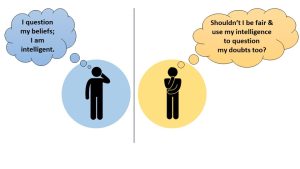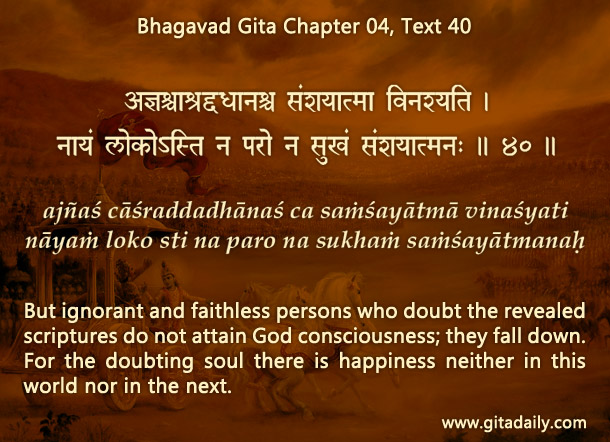 Suppose we grew up in an environment that fostered belief in things such as the teachings of sacred texts like the Bhagavad-gita. Over time, we may start questioning our beliefs — and we may see such questioning as a sign of our intelligence.
Suppose we grew up in an environment that fostered belief in things such as the teachings of sacred texts like the Bhagavad-gita. Over time, we may start questioning our beliefs — and we may see such questioning as a sign of our intelligence.
Appreciating such intelligence, the Bhagavad-gita encourages a questioning spirit. In fact, the whole Gita is started and sustained by Arjuna’s questions. Still, the Gita cautions about the dangerousness of doubting (04.40). Why is such caution needed? Because we may fall under the spell of our doubts, thereby treating our beliefs with iron fists while treating those doubts themselves with kid gloves.
To understand this dynamic, let’s envision it in terms of an inner conversation featuring three participants: our beliefs, our doubts and we ourselves. When we question our beliefs, our questions usually arise from our doubts. But as the inner questioning intensifies, our doubts may hijack the whole conversation — and let neither our beliefs or even us to speak in response to the doubts. Worse still, our doubts may start harassing and haranguing our beliefs in ways that even we would find unbalanced, unreasonable and unfair if those ways were adopted in an outer conversation we were a part of.
Just as we would stop such an unreasonable attacker externally, we need to stop our doubts internally. To restore fairness in our inner conversation, we need to question our doubts with the same rigor with which we questioned our beliefs. And for such questioning, we can let our beliefs be our resources.
When we thus ensure equal treatment for both our beliefs and our doubts, our inner conversation will be fruitful: it will take us toward a robust understanding that refines and even reinforces our core spiritual convictions.
One-sentence summary:
Question your doubts as much as you question your beliefs – if your beliefs aren’t given the benefit of the doubt, why give that benefit to your doubts?
Think it over:
- Why does the Gita caution us against doubting?
- How might doubts hijack our inner conversation?
- How can we ensure fairness in our inner conversation?
***
04.40: But ignorant and faithless persons who doubt the revealed scriptures do not attain God consciousness; they fall down. For the doubting soul there is happiness neither in this world nor in the next.
To know more about this verse, please click on the image


Leave A Comment